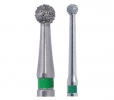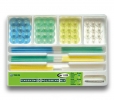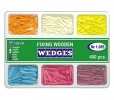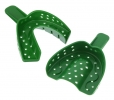OBJECTIVES
Narrow implants are indicated in areas of limited bone width or when grafting is nonviable. However, the reduction of implant diameter may compromise their performance. This study evaluated the reliability of several narrow implant systems under fatigue, after restored with single-unit crowns
MATERIALS AND METHODS
Narrow implant systems were divided (n = 18 each), as follows: Astra (ASC); BioHorizons (BSC);Straumann Roxolid (SNC), Intra-Lock (IMC), and Intra-Lock one-piece abutment (ILO). Maxillary central incisor crowns were cemented and subjected to step-stress accelerated life testing in water. Use level probability Weibull curves and reliability for a mission of 100,000 cycles at 130- and 180-N loads (90 % two-sided confidence intervals) were calculated. Scanning electron microscopy was used for fractography
RESULTS
Reliability for 100,000 cycles at 130 N was ∼99 % in group ASC, ∼99 % in BSC, ∼96 % in SNC, ∼99 % in IMC, and ∼100 % in ILO. At 180 N, reliability of ∼34 % resulted for the ASC group, ∼91 % for BSC, ∼53 % for SNC, ∼70 % for IMC, and ∼99 % for ILO. Abutment screw fracture was the main failure mode for all groups
CONCLUSIONS
Reliability was not different between systems for 100,000 cycles at the 130-N load. A significant decrease was observed at the 180-N load for ASC, SNC, and IMC, whereas it was maintained for BSC and ILO
CLINICAL RELEVANCE
The investigated narrow implants presented mechanical performance under fatigue that suggests their safe use as single crowns in the anterior region
Source: 26526325 PubMed - as supplied by publisher
Publication date: 2015 Nov 3





